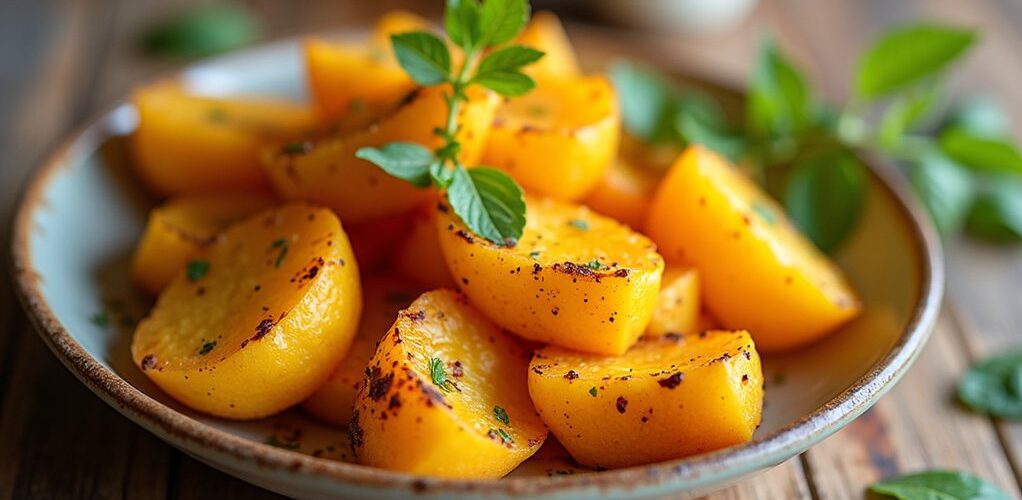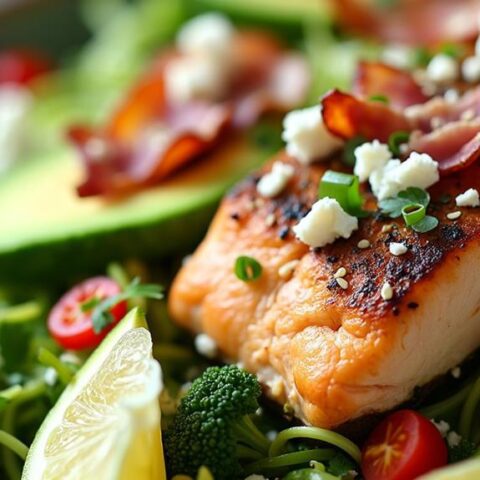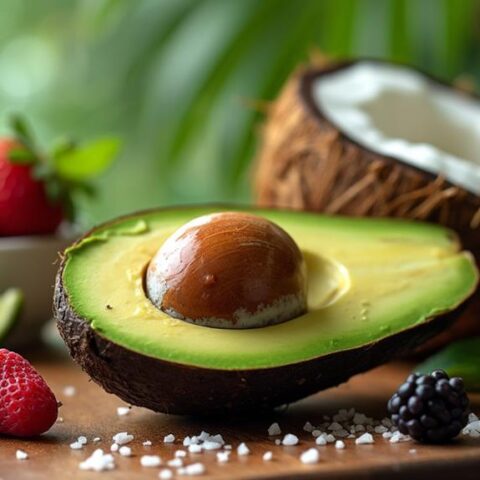
Jackfruit is not a low-carb food, containing approximately 23.25 grams of total carbohydrates per 100 grams, with 21.75 grams of net carbs after subtracting fiber. A single cup serving provides about 36 grams of net carbs, which exceeds most daily carb allowances for ketogenic diets. While young jackfruit has fewer carbs than ripe varieties, portion control remains essential for those monitoring carbohydrate intake. Understanding proper serving sizes and preparation methods can help incorporate this tropical fruit into various eating plans.
Key Takeaways
- Jackfruit is not considered low-carb, containing 21.75 grams of net carbs per 100 grams after subtracting fiber content.
- One cup of raw jackfruit contains 36 grams of net carbs, exceeding most daily carb limits for ketogenic diets.
- Young jackfruit has fewer carbs than ripe jackfruit, with 21.75 versus 38.3 grams per cup respectively.
- Small portions of 1/4 to 1/2 cup can be incorporated into low-carb diets as meat substitutes or flavor enhancers.
- Better low-carb alternatives include zucchini, mushrooms, and eggplant, each containing less than 4 grams of net carbs per 100g.
Understanding Jackfruit's Carbohydrate Profile
A thorough examination of jackfruit's carbohydrate composition reveals its challenging position in low-carb dietary plans. The tropical fruit contains approximately 23.25 grams of total carbohydrates per 100 grams, with only 1.5 grams of dietary fiber, resulting in 21.75 grams of net carbs.
Understanding jackfruit's carbohydrate profile is essential for those following strict low-carb diets or ketogenic lifestyles. A single cup of sliced raw jackfruit contributes about 36 grams of net carbs, which greatly impacts the daily carb allowance typically restricted to 20-50 grams on keto diets.
Despite the health benefits of jackfruit, its high carbohydrate content can disrupt ketosis, making it unsuitable for those adhering to strict low-carb dietary protocols.
Net Carbs Vs Total Carbs in Jackfruit
When examining jackfruit's carbohydrate composition, understanding the distinction between total carbs and net carbs reveals the fruit contains 23.25 grams of total carbohydrates per 100 grams, with fiber accounting for approximately 1.5 grams.
The calculation of net carbs, which subtracts fiber content from total carbohydrates, shows jackfruit contains about 21.75 grams of net carbs per 100 grams.
For those monitoring their carbohydrate intake, a standard serving of raw jackfruit (165 grams) contributes 36 grams of net carbs, making it a significant consideration within daily carbohydrate allowances, especially for those following low-carb dietary protocols.
Calculating Net Carb Content
Understanding the net carb content of jackfruit requires careful consideration of both total carbohydrates and dietary fiber content. For those following a low carb or keto diet, calculating net carbs is essential for maintaining their daily intake goals.
With 23.25 grams of total carbohydrates and 1.5 grams of fiber per 100 grams, jackfruit contains approximately 21.75 grams of net carbs.
A typical serving size of 165 grams provides about 36 grams of net carbs, making it a high carbohydrate food choice that can notably impact ketosis.
While jackfruit remains a popular option for vegetarian or vegan meal planning, its substantial carbohydrate count necessitates careful portion control and consideration when incorporating it into a low-carb eating plan.
Understanding Fiber's Role
The role of fiber in jackfruit creates an essential distinction between total carbohydrates and net carbs, greatly impacting its suitability for low-carb diets. Understanding this difference is vital for those monitoring carbohydrate intake, particularly on a ketogenic diet. While jackfruit contains approximately 23.25 grams of total carbohydrates per 100 grams, its dietary fiber content of 1.5 grams reduces the net carb count to 21.75 grams.
| Measure | Total Carbs | Net Impact |
|---|---|---|
| Per 100g | 23.25g | High-carb |
| Fiber Content | 1.5g | Minimal |
| Net Carbs | 21.75g | Significant |
| Cup Serving | 36g | Very High |
| Daily Impact | >50% Keto | Not Suitable |
This high net carb content makes jackfruit challenging to incorporate into strict low-carb diets, despite its health benefits and relatively low glycemic index.
Daily Carb Budget Impact
Managing daily carbohydrate intake requires careful consideration of both total and net carbs, particularly when incorporating jackfruit into a low-carb eating plan.
With approximately 23.25 grams of total carbohydrates and 21.75 grams of net carbs per 100 grams, jackfruit presents a significant impact on a daily carb budget. A typical serving of raw jackfruit contains nearly 36 grams of net carbs, which can quickly consume most or all of the daily allowance for strict keto dieters who limit their intake to 20-50 grams.
Due to its high carbohydrate content, jackfruit can disrupt ketosis and impede fat utilization, making it unsuitable for those following a keto diet. Low-carb dieters should explore alternatives to maintain their dietary goals effectively.
Young Vs Ripe Jackfruit: a Carb Comparison
The carbohydrate content between young and ripe jackfruit shows significant variation, with young jackfruit containing 23.25 grams per 100 grams compared to ripe jackfruit's higher 38.3 grams per cup.
Young jackfruit's lower net carb content of 21.75 grams makes it more suitable for low-carb cooking applications, particularly as a meat substitute in savory dishes.
While young jackfruit aligns well with ketogenic and low-carb dietary requirements, ripe jackfruit's higher sugar content makes it better suited for those following moderate to high-carbohydrate eating plans.
Carb Content Breakdown
Understanding carbohydrate differences between young and ripe jackfruit reveals significant variations that impact their suitability for low-carb diets.
Young jackfruit contains approximately 23.25 grams of total carbohydrates per 100 grams, while ripe jackfruit packs a higher 38.3 grams per cup, making it less suitable for carb-conscious eating plans.
The composition of these carbohydrates also differs significantly, with young jackfruit primarily containing starches and ripe jackfruit having more natural sugars.
Despite its lower carb content, young jackfruit's net carbs still exceed typical ketosis requirements at 21.75 grams per 100 grams.
While both varieties provide dietary fiber benefits, the increased sugar levels in ripe jackfruit require careful consideration for those monitoring their carbohydrate intake, particularly on restricted eating plans.
Best Uses By Stage
With distinct carbohydrate profiles established for both young and ripe jackfruit, selecting appropriate culinary applications becomes a straightforward process for health-conscious cooks.
Those monitoring carb intake should focus on unripe jackfruit, which contains fewer net carbs and serves excellently as a meat substitute in savory dishes.
The lower carbohydrate content of young jackfruit, at 36 grams per cup, makes it more suitable for low carb meal planning compared to its ripe counterpart, which contains 38.3 grams.
While ripe jackfruit's sweet flavor makes it perfect for desserts, its higher sugar content may challenge strict carb restrictions.
For best results, health-conscious individuals should utilize young jackfruit in savory preparations, reserving the ripe fruit for occasional treats when their carb allowance permits.
Which Stage Fits Keto
Despite its growing popularity as a meat alternative, neither young nor ripe jackfruit aligns with ketogenic dietary requirements, given their substantial carbohydrate content.
Young jackfruit contains approximately 21.75 grams of net carbs per 100 grams, while ripe jackfruit surpasses this with 38.3 grams per cup, making both varieties incompatible with low-carb protocols that typically restrict daily carbohydrate intake to 20-50 grams.
Although young jackfruit serves as an effective meat substitute due to its texture, its carbohydrate content remains too high for maintaining ketosis. For those following a ketogenic diet, better alternatives include low-carb vegetables like zucchini or mushrooms, which provide similar versatility without compromising ketosis.
Understanding these carbohydrate differences helps individuals make informed choices while adhering to their dietary goals.
Best Ways to Enjoy Jackfruit on a Low-Carb Diet
Although jackfruit contains a significant amount of carbohydrates, health-conscious individuals can still incorporate this versatile fruit into a low-carb eating plan through mindful portioning and strategic preparation methods.
Rather than using jackfruit as a main component of meals, consider utilizing smaller portions as a complementary ingredient in savory dishes.
Save carbs while savoring jackfruit by incorporating small amounts as a flavorful accent rather than the star of your meal.
Unripe jackfruit serves as an excellent meat substitute in various low-carb preparations, while maintaining portion control to manage net carbs.
To create balanced meals, combine jackfruit with lower-carb vegetables like zucchini or cauliflower.
The fruit's culinary versatility shines when paired with high-fat ingredients such as coconut milk, allowing for flavorful dishes that align with carbohydrate intake goals while satisfying cravings for tropical flavors.
Health Benefits Beyond the Carb Count
Jackfruit's nutritional profile extends far beyond its carbohydrate content, offering a remarkable array of health-promoting compounds and benefits. Despite its sweet taste, this tropical fruit maintains a low glycemic index and high fiber content, making it particularly beneficial for blood sugar control and diabetes management.
Key health advantages of jackfruit include:
- Rich vitamin C content that supports immune function and promotes skin health
- Powerful antioxidants that combat oxidative stress and inflammation, potentially reducing the risk of chronic diseases
- Significant potassium levels that contribute to heart health by helping regulate blood pressure
The fruit's robust fiber content also aids digestive health, while its unique combination of nutrients and compounds works synergistically to support overall wellness. This makes it a valuable addition to health-conscious diets.
Smart Portion Sizes for Carb Control
Managing portion sizes plays an essential role in successfully incorporating jackfruit into a low-carb diet. With 36 grams of net carbs in a standard 165-gram serving, careful monitoring becomes vital for maintaining carb control.
Health-conscious individuals should limit their intake to 1/4 to 1/2 cup portions, especially when following strict low-carb or ketogenic protocols.
To optimize jackfruit consumption while managing carb counts, consider using it as a flavor enhancer or meat substitute rather than the main component of meals.
Pairing smaller portions with low-carb foods like leafy greens and non-starchy vegetables helps balance the overall carbohydrate content. This strategic approach to moderation guarantees individuals can enjoy jackfruit's unique characteristics while staying within their daily carb limits and maintaining their dietary goals.
Low-Carb Alternatives to Jackfruit
For those seeking to minimize their carbohydrate intake while maintaining satisfying meal options, several wholesome alternatives to jackfruit stand ready to fill the plate.
These low-carb alternatives offer versatile choices for both vegetarian and meat-focused diets, with considerably lower net carbs than jackfruit.
Several nutrient-rich options stand out as excellent substitutes:
- Zucchini provides a mere 2.11g of net carbs per 100g, making it an ideal base for many dishes.
- Portobello and shiitake mushrooms serve as perfect meat alternatives, containing only 2.3g of net carbs while delivering a satisfying, meaty texture.
- Eggplant offers versatility with just 3.2g of net carbs, complemented by berries like strawberries and raspberries for sweeter alternatives.
For high-protein preferences, chicken represents a carb-free option that seamlessly replaces jackfruit in savory recipes.
Additionally, incorporating keto-friendly vegetables like spinach and cauliflower can enhance the nutrient density of meals while keeping carb content low.
Frequently Asked Questions
Can I Eat Jackfruit in a Low Carb Diet?
Jackfruit nutrition facts indicate it's not suitable for low-carb diets, containing 21.75g net carbs per 100g. Those following low-carb lifestyles should consider alternatives like zucchini or mushrooms for similar culinary uses.
Does Jackfruit Have a Lot of Carbs?
Jackfruit has a high carbohydrate content, containing approximately 23.25 grams of total carbs per 100 grams. Its nutritional profile shows about 21.75 grams of net carbs, making it unsuitable for low-carb dietary plans.
Does Jackfruit Spike Blood Sugar?
Jackfruit can moderately affect blood sugar levels due to its glycemic index and carbohydrate content. While its fiber content helps regulate blood glucose response, individuals monitoring sugar levels should consume this tropical fruit mindfully.
When Not to Eat Jackfruit?
Individuals should avoid jackfruit if they have birch pollen allergies, kidney disease, diabetes, or blood sugar concerns. Those sensitive to strong aromas or experiencing digestive issues should also exercise caution when consuming this fruit.
Conclusion
While jackfruit isn't strictly low-carb, it can be enjoyed mindfully within a balanced diet. Young jackfruit offers fewer carbohydrates and serves as an excellent meat substitute, while ripe jackfruit should be consumed in moderation by those monitoring their carb intake. By understanding portion control and choosing the right preparation method, health-conscious individuals can incorporate this nutrient-rich tropical fruit into their meal plans without compromising their dietary goals.










No Comments